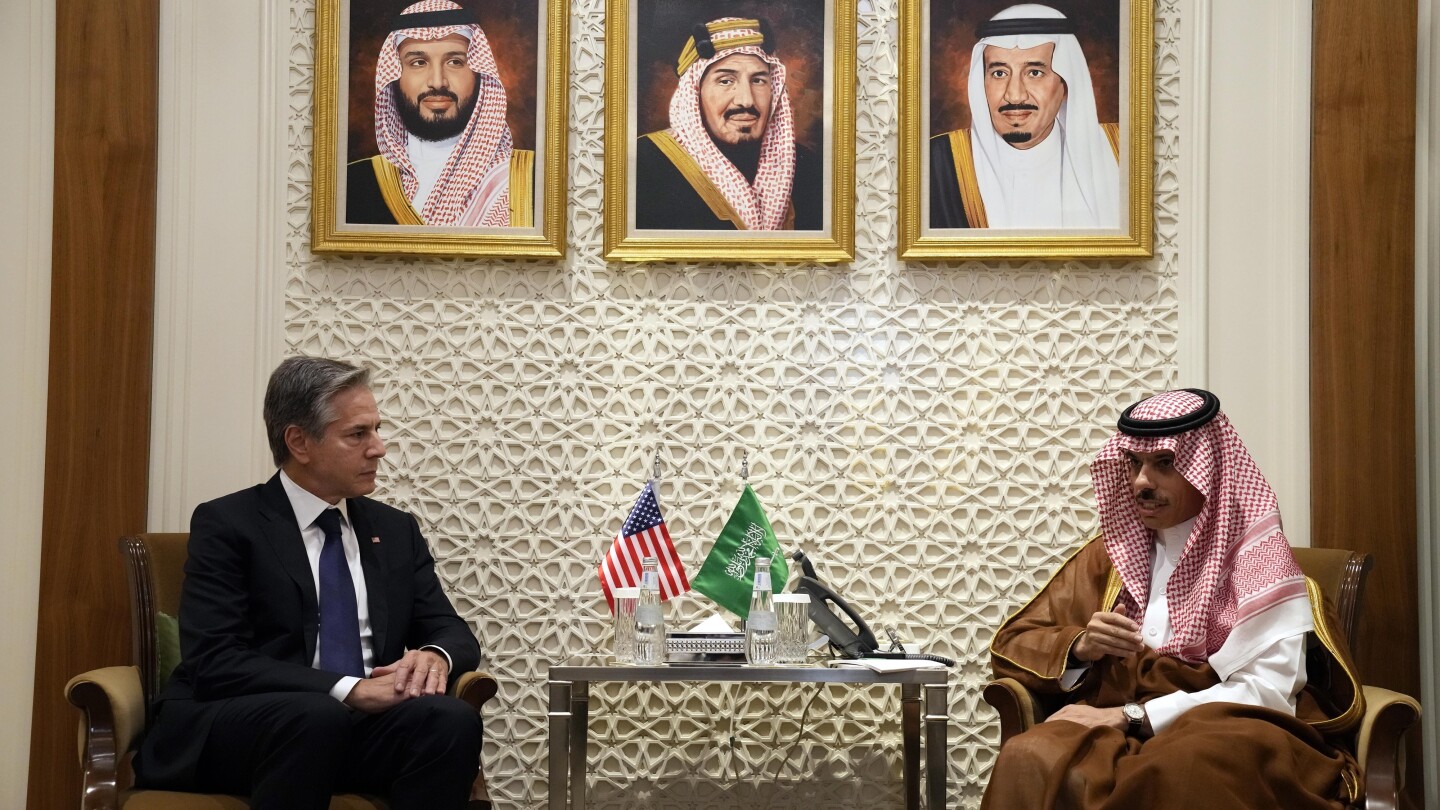RIYADH, Saudi Arabia (AP) — U.S. Secretary of State Antony Blinken called Saturday for protection for civilians in both the Gaza Strip and Israel as the Israeli military ordered half of the Palestinian territory’s population to evacuate in advance of an expected ground assault.
Blinken met his Saudi Arabian counterpart, Prince Faisal bin Farhan, in Riyadh as he began a third day of intense Middle East diplomacy aimed at preventing the Israel-Hamas war from expanding into a regional conflict and fueling a humanitarian crisis.
Both stressed the importance of minimizing the harm to civilians as Israel prepared for an anticipated incursion against Hamas a week after the militant group’s unprecedented attack in Israel.
“As Israel pursues its legitimate right, to defending its people and to trying to ensure that this never happens again, it is vitally important that all of us look out for civilians, and we’re working together to do exactly that,” Blinken said before heading to the United Arab Emirates for similar discussions.
“None of us want to see suffering by civilians on any side, whether it’s in Israel, whether it’s in Gaza, whether it’s anywhere else.”
A U.S official said Saturday that the U.S. did not ask Israel to slow or hold off on the evacuation plan. The official said the discussions with Israeli leaders did stress the importance of taking into account the safety of civilians as Israel’s military moved to enforce the evacuation demand.
The official, who spoke on condition of anonymity to talk about internal discussions, said the Israeli leaders acknowledged the guidance and took it under advisement.
In a sign of some small potential progress, a senior U.S. official traveling with Blinken said an agreement in principle had been worked out between Egypt, Israel and Qatar to allow Palestinian-Americans and other dual citizens in Gaza to cross the border into Egypt during a five-hour window on Saturday. There are an estimated 500 Americans living in Gaza, but that number is imprecise, officials have said.
However, the official said it was not immediately clear if Hamas would allow convoys of foreigners to reach the Rafah crossing unimpeded.
While stressing Israel’s right and obligation to defend itself and its citizens, Blinken repeated a warning to other countries and groups not to get involved.
“It’s vitally important … that we work together to make sure that to the best of our ability this conflict does not spread to other places on other fronts,” Blinken said.
Prince Faisal said Saudi Arabia is committed to the protection of civilians.
“It’s a disturbing situation,” he said. “It’s a very difficult situation. And, as you know, the primary sufferer of this situation are civilians, and civilian populations on both sides are being affected and it’s important, I think, that we all condemn the targeting of civilians in any form at any time by anyone.”
Faisal also said it was imperative for the violence to end.
“We need to work together to find a way out of this cycle of violence,” he said. “Without a concerted effort to end this constant return to violence, it will always be the civilians that suffer first, it will always be civilians on both sides that end up paying the price.”
Saudi Arabia called an urgent meeting of foreign ministers from the Organization of Islamic Cooperation, a 57-member bloc of Muslim countries. The OIC said in a statement Saturday that the meeting will “address the escalating military situation in Gaza and its environs as well as the deteriorating conditions that endanger the lives of civilians and the overall security and stability of the region.” The meeting will take place on Wednesday in Jeddah.
After his meeting in Abu Dhabi, Blinken plans to return to Saudi Arabia and then to travel on Sunday to Egypt. He has already visited Israel, Jordan, Qatar and Bahrain on his mission to show U.S. support for Israel as it prepares for the expected incursion into Gaza, but has also affirmed the importance of maintaining humanitarian aid in Gaza and preventing civilian casualties, in part by creating safe zones inside Gaza.
___
Baldor reported from aboard a U.S. military aircraft.

